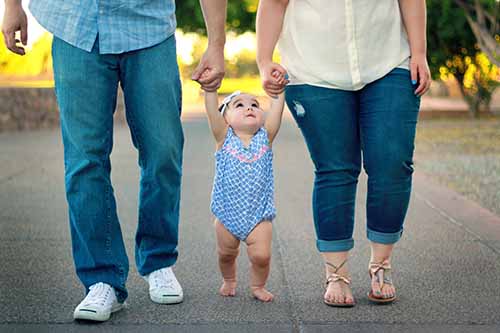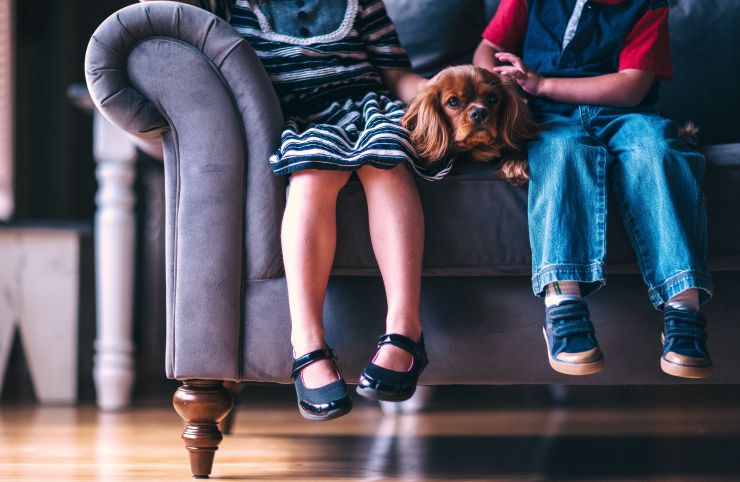Our guide to telling children about divorce and separation
There are always good ways of giving upsetting news. Preparation on the part of parents makes things a lot easier for kids and starts the co-parenting relationship off on the right foot.
For anyone with kids, this is perhaps the hardest part of separating or divorcing to navigate. It's a difficult conversation that most people don't know how to have or when its best to have. You might feel strongly that the time to tell your children about your divorce isn't right, or you might feel that hiding the truth from your kids can't go on much longer. Worst still, you might be at odds with your co-parent who sees things very differently. We know this is tough and we know many of these decisions depend on your specific circumstances.
To help you jump that first hurdle and face the conversation head-on, we've gathered some useful tips and insightful stories from separated parents and experts who have 'been there and done that' which may help you navigate this tricky part of the process.
Tip 1. Tell your kids what's going on
Saying nothing is rarely the best option but it's better to tell children once the decision to separate has been made (not when you are in the early stages of thinking about it) and when something is changing. Such as no longer spending time together as a family, the house going on the market and if one parent is moving out.
Action : Agree with your co-parent that this is an important conversation to have and that you will do it together; prep what you are going to say, how you will answer any questions they ask and plan a time for the talk. It's usually best to tell them at the beginning of the weekend when you are both potentially around and able to answer their questions.
Tip 2. Know the difference between sad and bad
How you think about a problem impacts how you solve it.
The ending of an unhappy marriage is a sad thing not a bad thing; what feels bad and what is bad are different things. There are good ways of giving upsetting news. The way in which you go into telling children about divorce and your behaviour following this will determine whether the children will feel short-term distress or suffer long-term damage. This is a key aspect of family change that is within your control.
Action : Present what's happening as a change, not the end of the world. Acknowledge the sadness your children express and that the concept of change can be hard to accept. Meet their emotions instead of leading them. Stay focused on their concerns. Don't try and dress it up as a good thing.
Tip 3. Keep it short and simple
The key message to convey to your children is that you are no longer together as life partners, but you are still together as their parents. The key messages are:
- We love you, we're sorry our decision is causing you distress
- It's not your fault
- We will both still continue to look after you, but it will be in different houses because we don't get on well enough with each other to want to live in the same house together anymore
- We will still be one family but in two households
Action: We love parenting expert, Sue Atkins’ idea of taking a large sheet of paper and drawing a big circle on it. Divide the circle into pieces of pie and work with the kids to fill in each segment with things that won't change. This will give your kids a sense of security and keep the changes from overwhelming them. It can make the process of telling kids about divorce a lot easier on everyone as it stops the idea of “total system breakdown” to enter your child’s mind.
Tip 4. Tell all of your children at the same time
Even if they are very different ages, they will gain support from each other. No one will feel excluded or that there are secrets. Everyone will have heard the same thing. You may have to phrase it in different ways for younger children but try and do this at the same time as telling the others.
Action : When planning what to say with your co-parent, take time to consider the children's individual personalities. As parents, you are the biggest experts in your child(ren), and you know their most likely individual reactions, questions, fears, and concerns.
Tip 5.Be truthful
This is a tricky one, the truth and everything are not the same thing. Kids need to be protected from aspects of the truth that would harm their need to feel safe with both of you. For example, don't blame the other parent for being the instigator of the split as this will cause a child to feel insecure. It will also make you look weak, as if the other parent calls the shots, and this can be tricky when you're co-parenting. Agree that when telling the children, you have both come to recognise this is the best way forward. Remember, the nitty-gritty of your adult relationship wouldn't be a topic of conversation were you still together, why should it be now?
Action : When I'm coaching parents and preparing them for these conversations, I use this test:
Before saying something, ask yourself - "Does this statement give our children some insight into how the divorce will impact their future lives?" If the answer is no, question whether you need to tell them.
As mentioned above, this will be one of the hardest conversations you’ll ever to have to have with your kids. There is no perfect script or guide for how to tell your kids you're getting a divorce. But following these simple steps, you can’t go too off-track from the best possible scenario.
Tip 6. Don't expect perfection
It's ok to be sad when telling children about divorce and separation. Don't worry about being emotional when you tell the children. It’s fine. It’s real and deeply saddening news. Your own release of emotion will signal to them that it's okay to feel sad and be distraught in front of them. Bad-mouthing or blaming because you lose control of your sadness, however, is harmful.
Action : If you're worried about your own emotional reaction and holding it together, speak to a Divorce Specialist, expert or family consultant to help you prep, practice and deal with your own emotions.
Tip 7. Don't be surprised by their reactions or lack of them
You may get a strong reaction or no reaction; everything is normal at this early stage. Try to acknowledge and accept their reactions. Try not to be offended or affronted if they appear to ignore the news or be confrontational about it. However they react, they will have heard you, and will be processing what they have heard in their own way and at their own speed. It might only take them a short time to do this, or it can take them a very long time (even into their adulthood). Either way, you should always reach out to them and be open to talking about the separation.
Action : Get some additional support if need be. Children who appear to be cycling through emotions are having a normal response to what is called the ‘grief cycle’. Sometimes, children get stuck in one particular emotion or behaviour (anger is a common one or bed-wetting). If this is the case, it's best to get some early support from the child's school or a family consultant. It's a tricky balance between being rightly concerned and being overanxious about a completely normal reaction.
If you've already told the children before reading this and you did it differently, don't worry. It's an imperfect world, we all make mistakes, and your kids will survive.
If you and your ex have said or say something blaming or bitter about the other within your children's earshot, then repairing that is always good. You could say to your child: *"I'm sorry; I shouldn't have spoken like that about Mum/Dad. I'm feeling cross with her/him at the moment, but I really understand that you don't want to have to hear that." *
It's never too late to start a new way of relating within the family. If you have any other tips to guide other parents in how to tell children about divorce or separation, please leave a comment below to share your experience and any relief or support you employed.
FAQs
What is the best and worst age for divorce for children?
The impact of divorce on children can vary depending on various factors, and it's important to note that there is no universal best or worst age for divorce for children. Each child's experience is unique, and the effects of divorce can be influenced by a range of factors, including their individual temperament, family dynamics, and the level of conflict or cooperation between the parents.
When should you tell your child you’re getting divorced?
The timing of when to tell your child about your impending divorce can be a crucial consideration. It's generally recommended to inform your child about the divorce as soon as the decision has been made and plans for separation are certain. Delaying the discussion for an extended period can lead to confusion for the child.
Is coparenting or parallel parenting the most effective method?
Ultimately, the best approach will depend on the unique dynamics of your family. For some parents, parallel parenting will be more effective than co-parenting, if communication is strained. You can find out more about this through our blog.
Read More

We've listed the most common childcare arrangements or ‘care patterns’ and what age group they are typically suitable for.

Advice on how to transition from parents to co-parents and protect your kids whilst you separate.

Answer three simple questions to receive a personalised divorce timeline straight into your inbox.

Co-parenting advice
Speak to an amicable Coach for help transitioning from parents to co-parents.





.png)
Comments (2)
Is it possible for a british citizen to file for divorce in a different county, where her wife is from?
why is how to tell you're kids your getting a divorce a blog ll dont !